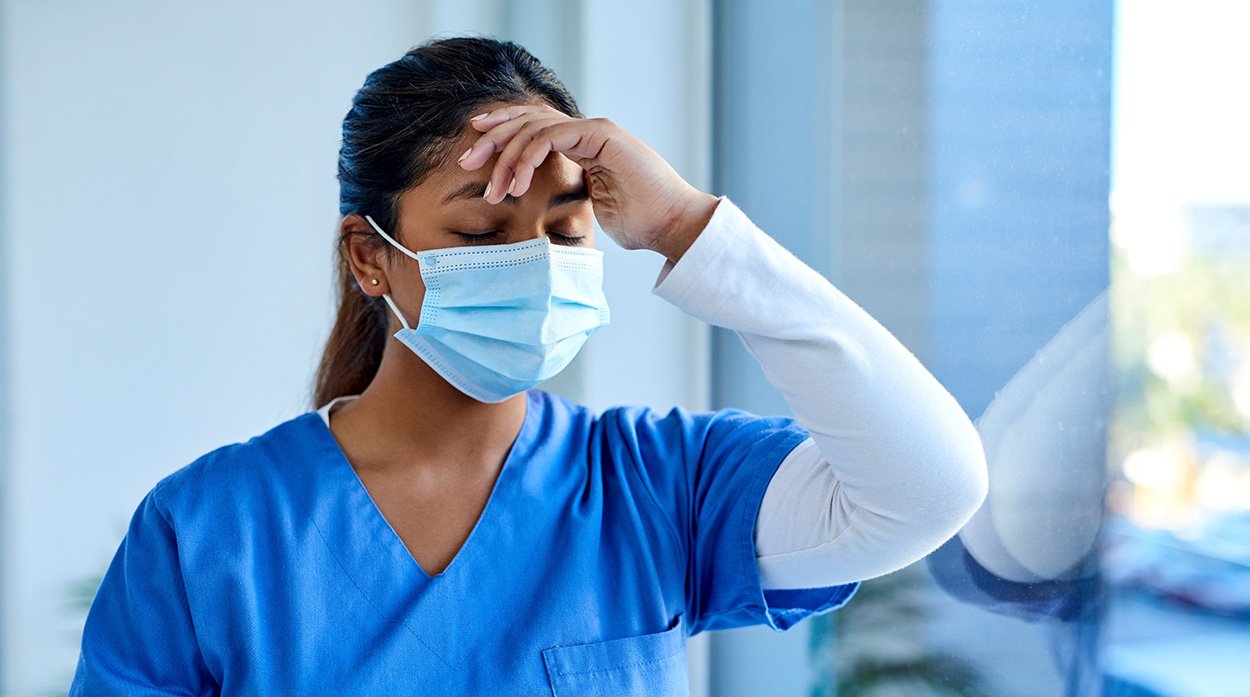
Lack of sleep increases the risk of Covid-19 infection
Those who work in the health sector during the Covid-19 pandemic are at particular risk of contracting the virus. A study now shows that lack of sleep and stress also play a role: Health workers who report frequent sleep problems have an 88 percent increased risk of developing Sars-CoV-2. Higher work stress is also associated with a higher risk of Covid-19 infection and a longer and more dangerous course. In contrast, every extra hour of sleep at night reduced the risk by 12%.
The Covid-19 pandemic poses special challenges for many people, including health workers: Many doctors and nurses are in daily contact with infected patients, and they have to cope with the increasing workload, while at the same time paying special attention to personal hygiene and their protection. Previous studies have already shown that health workers who participate in caring for Covid-19 patients are at a high risk of contracting the disease themselves. The biggest risk factor is frequent exposure to the virus.
Health workers from six countries were interviewed
A team led by Hyungo Kim from Johns Hopkins University in Baltimore has now shown that poor sleep and workload are also linked to the risk of developing Covid 19 disease. From July to September 2020, researchers surveyed 2,844 doctors and nurses from Germany, France, Italy, Spain, Great Britain and the USA on the conditions. Work, sleep habits and health status. All respondents have been in regular contact with Covid 19 patients at this time. 568 of them reported COVID-19.
Participants with their Covid-19 disease reported fewer hours of sleep at night, slightly more naps during the day and one or more sleep problems. They also often said that they felt overwhelmed by work at least once a month, ”summed up the researchers. In order to get more than a quick snapshot, questions about sleep duration and problems as well as feeling fatigue from work were not related to daily life during the pandemic, however. On average, the previous year, respondents said they slept six to seven hours a night.
Night sleep for health
If the researchers calculated the demographic data, the burden of exposure and other influencing factors, they found that every additional hour of sleep at night was associated with a 12% reduced risk of developing the disease. On the other hand, those who said they regularly had problems falling asleep, staying asleep and often taking sleeping pills had an 88 percent higher risk compared to people without sleep problems.
The effect of daytime naps was ambiguous: In France and the United States, health workers who slept regularly during the day were more likely to contract Covid-19. On the other hand, the trend in Spain was the opposite. “When it comes to day naps, there may be cultural differences,” the researchers say. “In some countries it can be a sign of stress and lack of sleep, while in others it is a tradition – like napping in Spain.”
Well-being is important to the immune system
Stress at work was also associated with a higher likelihood of disease and more severe and longer cycles. Compared to those who did not report any feelings related to fatigue, those who experienced this on a daily basis were more than twice as likely to contract Covid-19. These respondents also said that their injury was associated with more severe symptoms and that they required a longer recovery period about three times as often. These results apply regardless of how severely infected with Covid-19 is. It should be noted, however, that the survey only recorded the self-evaluation of those affected, and thus their memories could be distorted.
The researchers wrote: “Previous studies indicated that fatigue can cause disease, directly or indirectly, as occupational stress affects the immune system and alters cortisol levels.” Lack of sleep has been previously shown to be a risk factor for infectious diseases such as influenza and the common cold. The exact mechanism is unclear, however. “One hypothesis is that lack of sleep and sleep disturbances can negatively affect the immune system by increasing the inflammatory-promoting cytokines and histamines,” Kim and colleagues explain. So the new findings could also be relevant for people in other life situations and professions. They assert that chronic stress can weaken the immune system – and this is also evident with Covid-19.
Quelle: Hyunju Kim (John Hopkins University, Baltimore, USA) et al., BMJ Nutrition Prevention & Health, Doi: 10.1136 / bmjnph-2021-000228

“Organizer. Social media geek. General communicator. Bacon scholar. Proud pop culture trailblazer.”
